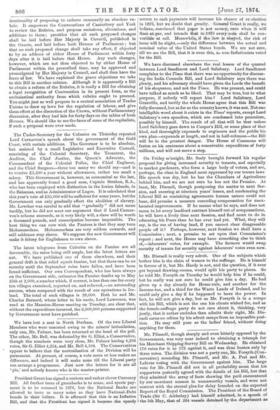We have discussed elsewhere the real lesson of the quarrel
between Lord Sandhurst and Lord Salisbury. Lord Sandhurst complains to the rases that there was no opportunity for discuss- ing the India Councils Bill, and Lord Salisbury says there was plenty, and his adversary should have given the Lords the benefit of his eloquence, and not the Times. He was present, and could' have talked as much as he liked. That may be true, but to what purpose, if nobody will report him ? Lord Salisbury, Lord Granville, and tacitly the whole House agree that this Bill was fully discussed, but as fax as the country knows, it was not. Not one- intelligible word about it exists in the Times' reports, except Lord Salisbury's own speeches, which are condensed into pemmican, possibly by himself. The result of all that will be that unless: Lord Salisbury goes down to Cooper's Hill, or some place of that kind, and thoroughly expounds to engineers and the public hia- own plan—expounds at length, and not in half-columns—the Bill will be in the greatest danger. The House of Commons will fasten on his sentences about a conceivable expenditure of forty millions, and will not move a step.


































 Previous page
Previous page